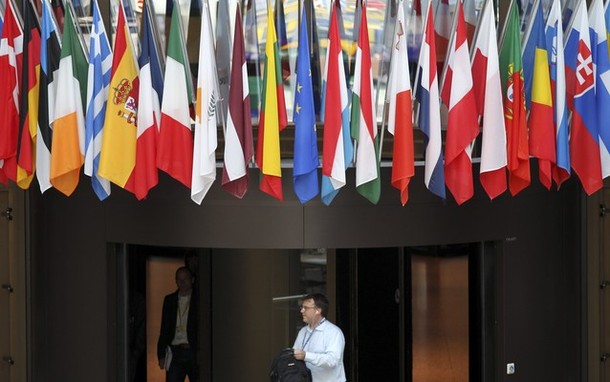The recent awarding of the Nobel Peace Prize to the European Union can be interpreted as a strong and important message to every single European: think about the disastrous consequences if the European project fails.
Many see European integration mostly as an economic endeavor. However, from the beginning, the idea behind creating the institutions that would eventually evolve into the EU was to help keep peace between European countries. Of course, Cold War and the military presence of the US via NATO were the main factors that kept the military confrontation within Europe at bay. But it would be an oversight not to see the EU as an important contributor to peaceful coexistence on the European continent. Due to the self-submission of German society to supra-national institutions and its assurance not to take any Sonderwege without consultation with European partners, the foreign policy of West Germany after World War II was based on a strong multilateral approach. German national interests equaled European interests, and the numbers of those identifying themselves as Europeans rather than Germans increased over years. The Monnet-Schuman plan to contain or at least curb revival of nationalism by institutional binding worked well for a long time. Until recently.
Today Europe faces tensions between the relatively prosperous north and the debt troubled south; doubt concerning the existence of European identity and solidarity; and an increase in nationalistic attitudes. The latter can clearly be seen not least in Germany itself. A number of commentators observe that the German elites do not perceive the EU as an existential imperative anymore. Events in recent years have demonstrated that German leaders are increasingly more reluctant to make compromises with their international partners. Berlin is now expected to take decisions independently from, and if needed in opposition to, its allies more often, and to pursue its national interest even more assertively.
As opinion polls show, Germans are quite dissatisfied with the current influence of its country on European politics, increasingly more skeptical towards the European project, and to a large extent at peace with the past. This change in attitude provides a significant opportunity for German officials to make decisions commensurable with the real capabilities of their country. Therefore, it is plausible to assume that as soon as German leaders see Germany as powerful enough, they will start believing that security benefits from cooperation are no longer substantial and the security costs of non-cooperation are tolerable. The euro crisis shows clearly that Berlin —the largest net contributor to the European budget—is not willing to pay any more without expecting a significant return on its investment: meaning increased control of, and influence on, European politics.
The trouble for Europe right now is, however, not only the rise of Germany’s power, but also incremental withdrawal of American troops and weapons from the European continent. A dangerous power vacuum could result. Great Britain, France, Poland and other European countries could become engaged in counterbalancing German power. In order to gain advantage over the counter-coalition, Germany would have to acquire nuclear weapons. Russia should not be assumed to accept this idea and would enter the game trying to prevent Germany from obtaining weapons of mass destruction. In short, a security dilemma might eventually break out and the old power politics with disastrous consequences for Europe would rise again.
Some years ago this scenario would have sounded bizarre. Perhaps it still does. The current situation, however, opens the eyes of even the most idealistic Believers in the European project: The European arena is and always has been about competition of power and influence. A long period of peace has been created by the US presence in Europe and the self-restraint of Germany bound within European institutions. This is not to say that after a withdrawal of US forces from Europe, Germany would want to attack any other country militarily. Rather, economic means, including economic blackmail, are certainly much more efficient instruments of power politics today.
For some Greeks, this scenario has already become real: According to a Greek lawyer quoted recently in the New York Times, Germany “is in an economic war with southern Europe. I consider this war equal to real war. They don’t help peace.” Attitudes in Greece, Spain, and Portugal show clearly that the southern part of Europe regards Germany as a rival rather than a partner – have London, Paris as well as Central- and Eastern European capitals ever really thought differently?
In sum, the Nobel Peace Prize to the European Union most likely refers neither to the past nor the current situation in Europe. Some assume that it should have been given twenty years ago; others argue that is even now premature. In truth, it makes perfect sense today, as we find ourselves in the middle of the biggest crises since the beginning of European integration, faced with rising tensions, increased extremism and nationalism, and growing aspirations for more emancipation from Washington. In fact, the award is indeed a warning sign that the future can be disastrous, if we continue denying that war in Europe— in whatever form—is possible, that power can only be contained with power, and that we still need a well-anchored US military presence on the European continent.
Daria W. Dylla teaches International Politics and Foreign Policy at the University of Cologne.
Image: european_union.jpg
